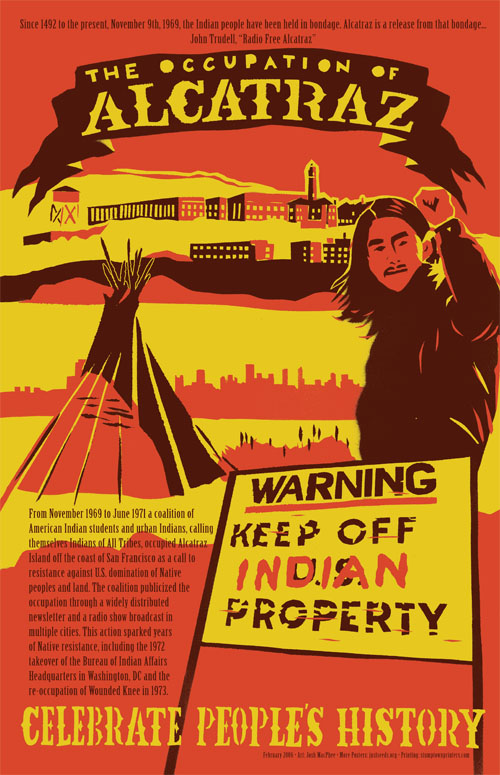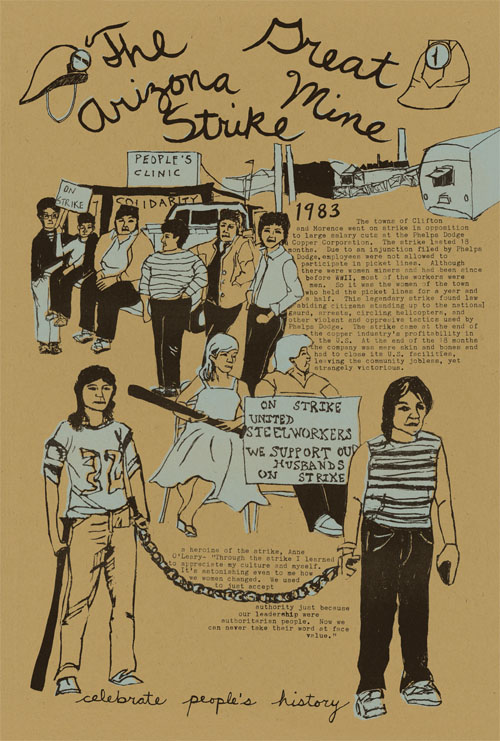
Josh MacPhee, Celebrate Peoples’ History
If in the last ten years you’ve traveled under the auspices of attending a lefty rally, protest, or conference, or you’ve spent time in a community center, a crusty punk group house, a union hall or a progressive bookstore, then you’ve probably seen some of the graphic arts distributed by justseeds.org. One particularly popular set of posters is the Celebrate People’s History series, organized by Justseeds founder Josh MacPhee. These posters, highlighting hidden and obscured histories of social movements, from the abolition of slavery to ACT-UP, show up in the most surprising and diverse contexts. In public school classrooms, they serve as the graphic curriculum equivalent to Howard Zinn’s People’s History of the United States, whereas in the social centers and bookstores of today’s leftist and sub-cultural movements, they serve as a constant reminder of the roots of struggle and of significant battles for emancipation and justice.
Justseeds was started in Chicago in 1997 and was initially conceived as a distribution platform for MacPhee’s artwork (which included an assortment of stenciled and block prints, zines, and the people’s history posters).
Carlos Fernandez of Chicago Jobs with Justice was one of many activists that encountered this work in the streets, on tables at political conferences, and on the walls of social-movement centers. He reflected, “In my encounters with the work spread by Justseeds, I realized that art’s role in political struggle could be bigger. It has offered valuable commentary, but by politicizing its production—the costs, the collaboration—it could also show how to put the ideals we voice into creative practice. I saw this in lots of small but important ways: how it was made, where it appeared, how it got into people’s hands.”

Beth Pulcinella, Celebrate Peoples’ History
Over the years, Justseeds gained street cred and notoriety amongst a diverse set of young teachers, community organizers, contemporary artists, and graffiti writers. As this happened, MacPhee took steps to build stronger networks in his new milieu of left-leaning artists (specifi cally the low-budget producers like print makers and graffi ti writers). His organizational aspirations found inspiration in the late ’80s Boston-area punk scene and various anarchist, prison solidarity, and anti-racist networks in the ’90s.
According to MacPhee, “Networks and organization are not simply tools to be more effi cient or successful, but the building blocks of creating a new world. Our current society is structured to make us feel like atomized individuals, alienated from others and ourselves. This makes us more vulnerable to the massive amount of corporate and state propaganda we are bombarded with daily. By building organizations and communities where we try to really connect, understand, and support each other, we can build the collective tools necessary to both live our lives for personal self-fulfillment as well as change the larger society so that all will be free to do the same.”
MacPhee was doing the legwork to cultivate a new community through the facilitation of such ambitious projects as the Celebrate People’s History poster series (which now has posters made by over forty artists from across the globe and can be subscribed to like a magazine), the Stencil Pirates book (in its fifth edition from Soft Skull Press), the Street Art Workers (SAW) network of printmakers who produce coordinated campaigns, and several incarnations of the Paper Politics exhibit with over 200 printmakers.

Paper Politics in Milwaukee at Walkers Point Art Center (photo by Josh MacPhee
